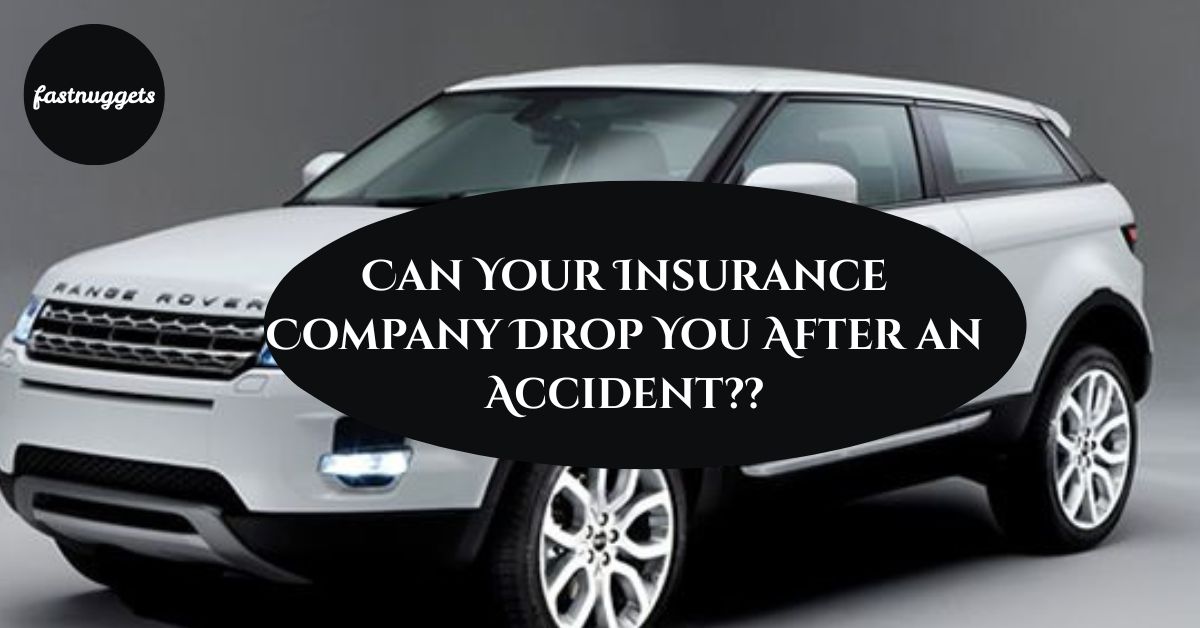Accidents happen, even to the most careful drivers. But after the shock of a collision and dealing with repairs, many drivers face another stressful question: Can your insurance company drop you after an accident? The answer is yes but it depends on the circumstances, your driving history, and your insurance provider’s policies.
In this guide, we’ll explore when insurers may cancel or non-renew your policy, what the law says in the U.S., and how you can protect yourself from losing coverage.
Understanding Policy Cancellation vs. Non-Renewal
Before diving deeper, it’s important to understand the difference between cancellation and non-renewal:
- Cancellation means your policy is terminated before its expiration date. This can happen if you fail to pay premiums, commit insurance fraud, or have your driver’s license suspended.
- Non-renewal means the insurance company chooses not to continue your policy once your term ends, usually after 6 or 12 months.
After an accident, most insurers won’t cancel your policy mid-term unless the accident was extremely severe, involved reckless or illegal driving, or you violated the terms of your policy. However, they may decide not to renew it later.
When Can Your Insurance Company Drop You After an Accident?
Insurance companies assess risk. If they believe you’re too risky to insure, they may decide to end your coverage. Common reasons include:
- Multiple At-Fault Accidents
- If you’ve been in several at-fault accidents within a short period, your insurer may see you as high-risk.
- If you’ve been in several at-fault accidents within a short period, your insurer may see you as high-risk.
- Serious Violations
- Accidents involving DUI, reckless driving, or driving without a valid license can lead to immediate cancellation.
- Accidents involving DUI, reckless driving, or driving without a valid license can lead to immediate cancellation.
- High Claim Costs
- If your accident results in significant payouts, the insurer may consider you too costly to cover.
- If your accident results in significant payouts, the insurer may consider you too costly to cover.
- Pattern of Risky Behavior
- Combining accidents with frequent traffic violations often triggers non-renewal.
- Combining accidents with frequent traffic violations often triggers non-renewal.
State Laws Protect Drivers
The good news is, U.S. state laws regulate when and how insurers can drop customers. For example:
- Most states require advance written notice—typically 30 days before cancellation or non-renewal.
- Some states, like California, have stricter rules, making it harder for insurers to drop a policy after just one accident.
- You have the right to request the specific reason for cancellation or non-renewal.
It’s worth checking your state’s Department of Insurance website for the exact laws in your area.
What to Do If Your Insurance Company Drops You
If your insurer decides not to renew your policy after an accident, take the following steps:
1. Act Quickly
Don’t wait until your current policy expires. Start shopping for a new policy immediately to avoid a lapse in coverage, which could make future insurance more expensive.
2. Compare Multiple Quotes
Use comparison sites or contact agents directly to get at least three quotes. Look for insurers that specialize in high-risk drivers, as they may be more willing to offer coverage.
3. Consider State-Assigned Risk Pools
If you’re unable to get insurance through standard companies, your state may offer an assigned risk plan that ensures you can still drive legally.
4. Improve Your Driving Record
Take a defensive driving course, follow traffic laws carefully, and avoid risky situations to rebuild your record over time.
5. Adjust Your Coverage
If cost is an issue, consider higher deductibles or reducing optional coverages—but never drop liability coverage, which is required by law.
How to Prevent Being Dropped After an Accident
While you can’t undo the past, there are proactive steps to reduce the chance of losing your policy:
- Drive Defensively – Avoid aggressive driving and maintain safe distances.
- Limit Claims – If damage is minor, consider paying out-of-pocket instead of filing small claims.
- Maintain Good Credit – In many states, insurers factor credit history into rate decisions.
- Stay Loyal, But Shop Around – Long-term customers with good payment history are less likely to be dropped, but always compare rates annually.
CONCLUSION
Yes, your insurance company can drop you after an accident, but it’s not always automatic, especially after just one minor incident. Understanding your rights, acting quickly if dropped, and practicing safe driving habits can help you maintain coverage and avoid future problems.
If you’ve recently been in an accident and are worried about your coverage, now is the time to review your policy, know your state’s rules, and shop for the best options to protect yourself and your vehicle.
